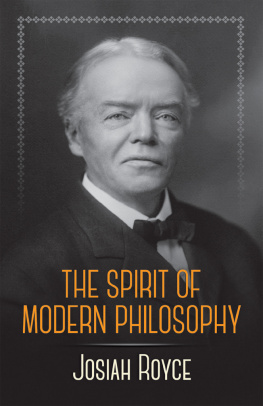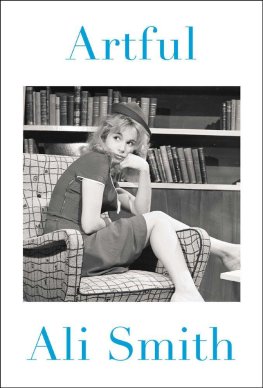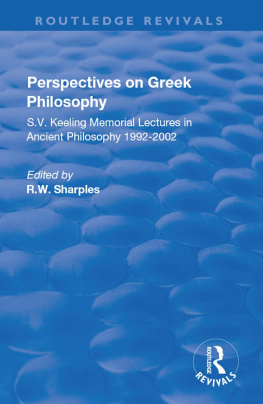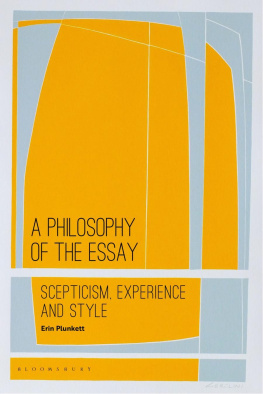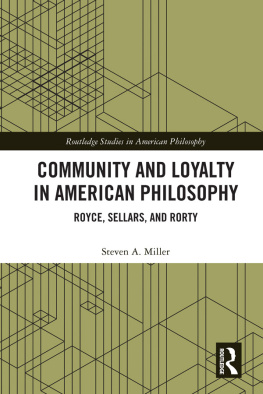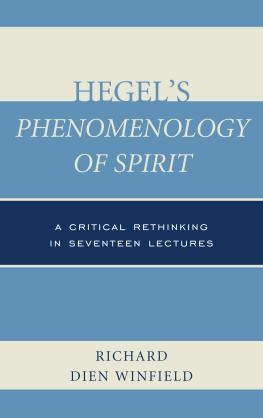Josiah Royce - The Spirit of Modern Philosophy: An Essay in the Form of Lectures
Here you can read online Josiah Royce - The Spirit of Modern Philosophy: An Essay in the Form of Lectures full text of the book (entire story) in english for free. Download pdf and epub, get meaning, cover and reviews about this ebook. year: 2015, publisher: Dover Publications, Inc, genre: Religion. Description of the work, (preface) as well as reviews are available. Best literature library LitArk.com created for fans of good reading and offers a wide selection of genres:
Romance novel
Science fiction
Adventure
Detective
Science
History
Home and family
Prose
Art
Politics
Computer
Non-fiction
Religion
Business
Children
Humor
Choose a favorite category and find really read worthwhile books. Enjoy immersion in the world of imagination, feel the emotions of the characters or learn something new for yourself, make an fascinating discovery.
- Book:The Spirit of Modern Philosophy: An Essay in the Form of Lectures
- Author:
- Publisher:Dover Publications, Inc
- Genre:
- Year:2015
- Rating:3 / 5
- Favourites:Add to favourites
- Your mark:
- 60
- 1
- 2
- 3
- 4
- 5
The Spirit of Modern Philosophy: An Essay in the Form of Lectures: summary, description and annotation
We offer to read an annotation, description, summary or preface (depends on what the author of the book "The Spirit of Modern Philosophy: An Essay in the Form of Lectures" wrote himself). If you haven't found the necessary information about the book — write in the comments, we will try to find it.
Josiah Royce: author's other books
Who wrote The Spirit of Modern Philosophy: An Essay in the Form of Lectures? Find out the surname, the name of the author of the book and a list of all author's works by series.
The Spirit of Modern Philosophy: An Essay in the Form of Lectures — read online for free the complete book (whole text) full work
Below is the text of the book, divided by pages. System saving the place of the last page read, allows you to conveniently read the book "The Spirit of Modern Philosophy: An Essay in the Form of Lectures" online for free, without having to search again every time where you left off. Put a bookmark, and you can go to the page where you finished reading at any time.
Font size:
Interval:
Bookmark:
M INEOLA , N EW Y ORK
TO MY FRIEND

I GRATEFULLY DEDICATE THIS BOOK
AS A TOKEN OF AFFECTION AND VENERATION
IN RECOGNITION OF THE WISE COUNSEL
THAT SUGGESTED ITS PREPARATION
AND OF THE THOUGHTFUL ADVICE
THAT ACCOMPANIED AND AIDED
ITS GROWTH

Bibliographical Note
This Dover edition, first published in 1983 and reissued in 2015, is an unabridged republication of the work originally published by Houghton, Mifflin and Company, Boston, in 1892.
Library of Congress Cataloging in Publication Data
Royce, Josiah, 1855-1916.
The spirit of modern philosophy.
eISBN-13: 978-0-486-16843-2
Reprint. Originally published: Boston: Houghton, Mifflin, 1892.
1. Philosophy, Modern. I. Title.
B791.R8 1983 19082-17724
Manufactured in the United States by Courier Corporation
24432602 2015
www.doverpublications.com

T HE friend to whom I have dedicated this book asked me, a little more than two years ago, for some account of the more significant spiritual possessions of a few prominent modern thinkers. I was to tell what I could about these possessions in comparatively brief and un-technical fashion. With some misgivings as to my right and many misgivings as to my power to set forth any portion of the content of modern philosophy in the compass of a few short lectures, I still undertook the task, and soon found it unexpectedly absorbing. The company of friends for whom I was to prepare my lectures proved to be more numerous than I had foreseen; the undertaking became more elaborate and thorough-going than I had any way intended; and the exceeding kindliness and earnestness of my hearers called erelong for a response that taxed all my poor wit to the utmost. My lectures once finished in their first form, under the general title Representative Modern Thinkers and Problems, I was asked to read them yet again, before another equally cordial and stimulating company in another city. The re-reading suggested, of course, much revision. In the following year I again offered my papers, partly rewritten and much enlarged, to the members of Harvard University, as public evening lectures. Still other opportunities to present all or part of the same material to various audiences caused me to get considerable critical aid. I then resolved to give the whole discussion a final form.
This volume contains, therefore, an essay, in the shape of a series of lectures, and with a twofold object. On the one hand my essay deals not so much with the minuter details as with the connections, the linkages, the general growth, of modern philosophical thought since the seventeenth century. On the other hand my purpose is constructive as well as expository. I have my own philosophical creed,a growing and still elementary one, indeed; and this creed has been strongly suggested to me by what I know of the progress and outcome of modern thought. What I have seen I delight to try to suggest. And the book is the product of my delight, and the embodiment of my efforts at suggestion.
On the other hand, these studies are not mere fragments, but are bound together by a single principal idea, this idea being the one that seems to me to embody the true spirit of modern philosophy,the doctrine concerning the world which, amidst all our vast ignorance of nature and of destiny, we still have a right to call, in its main and simple outlines, a sure possession of human thought. What this doctrine is I have already had occasion to suggest in the more positive chapters of my book called The Religious Aspect of Philosophy. To the arguments of that work, particularly to the chapters therein entitled The Possibility of Error and The Religious Insight (the first containing a metaphysical discussion of the proof of the main thesis of Objective Idealism, the other a general sketch of certain consequences of this thesis), I must refer such readers as may desire a fuller acquaintance with some matters of fundamental importance which the present study, in view of its limitations, will leave more or less incomplete. But these lectures have their own unity, are intended to be understood by themselves, represent, I hope, a considerable advance in the organization of the philosophical doctrine which was set forth in the former book, and meanwhile have the decided advantage which the historical fashion of philosophizing always possesses as against the dialectical fashion.
Our common dependence upon the history of thought for all our reflective undertakings is unquestionable. Our best originality, if we ever get any originality, must spring from this very dependence. Doctrines of genuinely revolutionary significance are rare indeed in the history of speculation, and they ought to be so. Of lesser surprises, of marvels, of beautifully novel insights, all the greater highways of speculation are full; and yet most of the marvels are only such in so far as they are set off upon a very large background of the historically familiar. Only a very few times in the history of thought is the continuity of the evolution distinctly broken. The novelties are elsewhere only relative, and get their very value from the fact that they are so.
For us to-day, after so many centuries of philosophy, the necessity of keeping in mind our relation to earlier thought is peculiarly pressing, and the neglect (or misunderstanding) of those historical relations is peculiarly disastrous. Mere eclecticism in philosophy is of course worthless. But to condemn the past, as full of error and delusion, and then to set forth what we imagine to be our own fundamentally significant and wholly new methods in philosophy, is a procedure that in general can have but one ending. We, then, but unwittingly transplant old growths to new soil, seeing not how old the growths are, and considering only the newness of the garden that we have planned. But the new soil is of necessity lacking in the ancient wealth and depth, and the transplanted doctrines take little root. Synthesis and critical re-organization of the truths furnished us by the past, in the light of present science, is not mere eclecticism, and leaves ample room for healthy originality. On the other hand, it is so easy to feel a train of philosophical thought to be wholly new, merely because we have eagerly thought it out, and have been all the while unaware of our actual philosophical environment and atmosphere. And yet this subjective sensation of originality,to what unnecessary cares, to what disappointments may it not in the end lead us!
Such misadventures, I, for my part, am minded to avoid by remaining fully aware of my historical relations. Faithfulness to history is the beginning of creative wisdom. I love the latter, and want to get it. To that end, however, I cultivate the former.
The present philosophical situation in this country seems to be peculiarly favorable to such efforts. Two philosophical branches are especially prospering to-day in our Universities, the study of Empirical Psychology, and the study of the History of Philosophy. I believe for my own part that these two pursuits ought to flourish and will flourish together, and that they will lead to very important constructive work. I see no just opposition of spirit between them.
Font size:
Interval:
Bookmark:
Similar books «The Spirit of Modern Philosophy: An Essay in the Form of Lectures»
Look at similar books to The Spirit of Modern Philosophy: An Essay in the Form of Lectures. We have selected literature similar in name and meaning in the hope of providing readers with more options to find new, interesting, not yet read works.
Discussion, reviews of the book The Spirit of Modern Philosophy: An Essay in the Form of Lectures and just readers' own opinions. Leave your comments, write what you think about the work, its meaning or the main characters. Specify what exactly you liked and what you didn't like, and why you think so.

